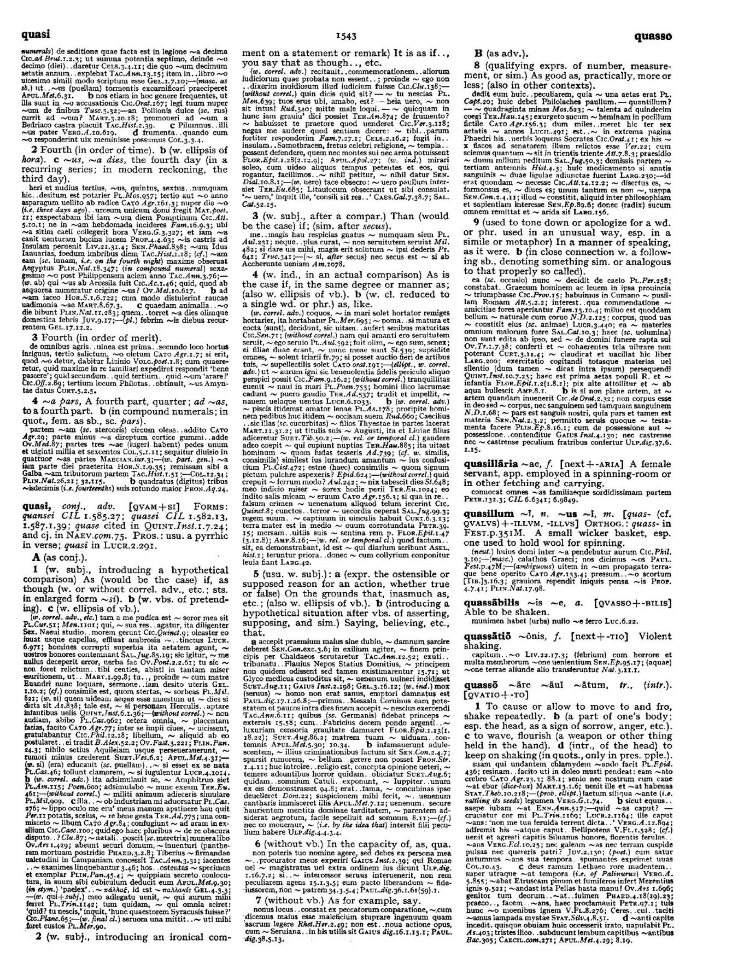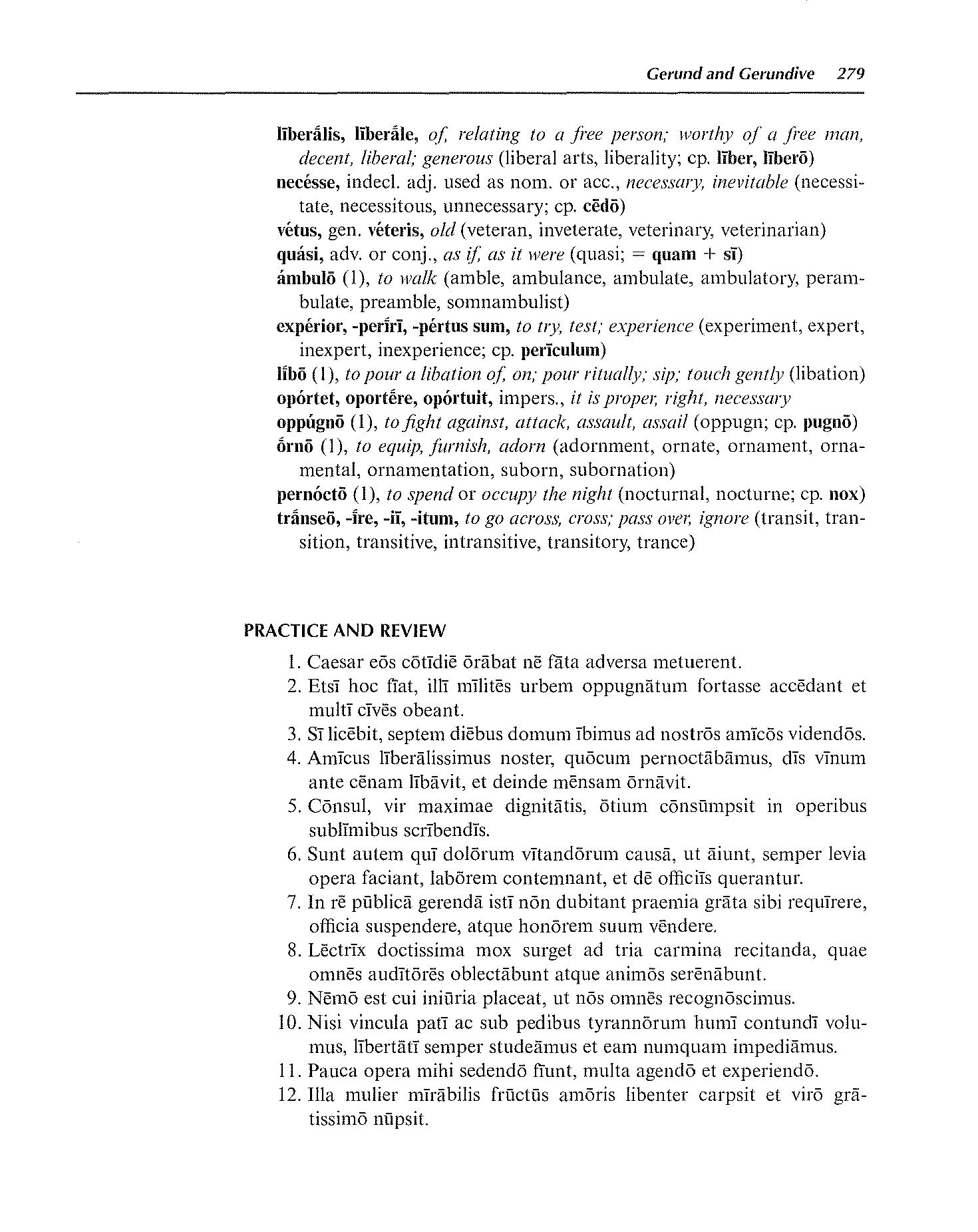
page_listing.tpl
page_subListingDetails.tpl
sub_listingDetails_style1.tpl
sub_listingDetails.title.tpl
quasi as if
quasi is a Latin Conjunction that primarily means as if.
Definitions for quasi
Wheelock's Latin
Conjunction
- 1
adv. or conj., as if, as it were
English derivatives:
quasi
Oxford Latin Dictionary
Conjunction
- 1
(w. subj., introducing a hypothetical comparison) As (would be the case) if, as though (w. or without correl. adv., etc.; sts. in enlarged form ~si). (b) (w. vbs. of pretending). (c) (w. ellipsis of vb.).
- 2
(w. subj., introducing an ironical comment on a statement or remark) It is as if.., you say that as though.., etc.
- 3
(w. subj., after a compar.) Than (would be the case) if; (sim after secus).
Adverb
- 1
(qualifying exprs. of number, measurement, or sim.) As good as, practically, more or less; (also in other contexts).
- 2
(used to tone down or apologize for a wd. or phr. used in an unusual way, esp. in a simile or metaphor) In a manner of speaking, as it were. (b) (in close connection w. a following sb., denoting something sim. or analogous to that properly so called).
Sentences with quasi
Latin to English
Instrue praeceptis animum, ne discere cessa; nam sine doctrina vita est quasi mortis imago.Compare Furnish your mind with precepts, never stop learning; for life without learning is but an image of death.
Sic rerum summa novatur semper, et inter se mortales mutua vivunt. augescunt aliae gentes. aliae minuuntur, inque brevi spatio mutantur saecla animantum et quasi cursores vitai lampada traduntCompare Thus the sum of things is everbeing renewed, and mortal creatures live dependent one upon another. Some nations increase, others diminish, and in a short space the generations of living creatures are changed and like runners pass on the torch of life.
Ita vitast hominum quasi quo ludas tesseris.Compare Human life is like shooting dice.
Neque ego ego abdo, neque ita gero, quasi homo aut tempus iratus.Compare I neither hid myself, nor conducted nyself, as if angry with the man or the times.
Data sources
Notes
- Definitions
- Frederick M. Wheelock, Wheelock's Latin, 6th ed., rev. Richard A. LaFleur (New York, NY: HarperCollins Publishers, 2005): 279.
- P. G. W. Glare, Oxford Latin Dictionary, Vols. 1-8 (Oxford: Clarendon Press, 1982): 1543.
- Word frequencies
- Christopher Francese, "Latin Core Vocabulary," Dickinson College Commentaries, last modified 2014, http://dcc.dickinson.edu.
- Paul B. Diederich, The Frequency of Latin Words and Their Endings, PhD diss., (Columbia University, 1939).
- Louis Delatte, Suzanne Govaerts, Joseph Denooz, and Etienne Evrard, Dictionnaire fréquentiel et index inverse de la langue latine [Frequency Dictionary and Inverse Index of the Latin Language] (Liège, Belgium: Laboratoire d'analyse statistique des langues anciennes de l'Université de Liège [L.A.S.L.A.], 1981): 119-219.
Bibliography
Allen, Joseph H. Allen and Greenough's New Latin Grammar for Schools and Colleges: Founded on Comparative Grammar. Edited by James B. Greenough, George L. Kittredge, Albert A. Howard, and Benjamin L. D'Ooge. Boston, MA: Ginn & Company, 1903.
Crystal, David. A Dictionary of Linguistics and Phonetics. 6th ed. Oxford, UK: Blackwell Publishing, 2008.
Delatte, Louis, Suzanne Govaerts, Joseph Denooz, and Etienne Evrard. Dictionnaire fréquentiel et index inverse de la langue latine [Frequency Dictionary and Inverse Index of the Latin Language]. Liège, Belgium: Laboratoire d'analyse statistique des langues anciennes de l'Université de Liège (L.A.S.L.A.), 1981.
Diederich, Paul B. The Frequency of Latin Words and Their Endings. PhD diss., Columbia University, 1939.
Francese, Christopher. "Latin Core Vocabulary." Dickinson College Commentaries. Last modified 2014. http://dcc.dickinson.edu/latin-vocabulary-list.
Gildersleeve, Basil L., and Gonzales Lodge. Gildersleeve's Latin Grammar: Third Edition, Revised, and Enlarged. 3rd ed. London, England: Macmillan and Co., 1903.
Glare, Peter G.W. Oxford Latin Dictionary. Vols. 1-8. Oxford, England: Clarendon Press, 1982.
Krüger, Bernd. "Latin Conjugation Tables." Cactus2000. Accessed May 5, 2023. https://latin.cactus2000.de/index.en.php.
Pierson, Nick. "Sound of Text." Accessed October 26, 2019. https://soundoftext.com.
Wheelock, Frederick M. Wheelock's Latin. 6th ed. Revised by Richard A. LaFleur. New York, NY: HarperCollins Publishers, 2005.
Wiktionary Contributors. "Victionarium." Wikimedia Foundation, Inc. Updated March 18, 2019. https://la.wiktionary.org/wiki/Victionarium:Pagina_prima.
Citation
Chicago (17th ed.)
Allo Contributors. "quasi (conj.) - Latin Word Definition." Allo Latin Dictionary. Last modified . Accessed February 19, 2026. http://ancientlanguages.org/latin/dictionary/quasi.
Entry created on . Last updated on .







